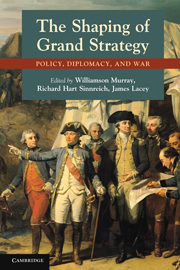Book contents
- Frontmatter
- Contents
- Contributors
- 1 Thoughts on grand strategy
- 2 The grand strategy of the grand siècle: Learning from the wars of Louis XIV
- 3 Strategic culture and the Seven Years' War
- 4 Strategy as character: Bismarck and the Prusso-German question, 1862–1878
- 5 About turn: British strategic transformation from Salisbury to Grey
- 6 British grand strategy, 1933–1942
- 7 Toward a strategy: Creating an American strategy for global war, 1940–1943
- 8 Harry S. Truman and the forming of American grand strategy in the Cold War, 1945–1953
- 9 Patterns of grand strategy
- Index
1 - Thoughts on grand strategy
Published online by Cambridge University Press: 05 June 2012
- Frontmatter
- Contents
- Contributors
- 1 Thoughts on grand strategy
- 2 The grand strategy of the grand siècle: Learning from the wars of Louis XIV
- 3 Strategic culture and the Seven Years' War
- 4 Strategy as character: Bismarck and the Prusso-German question, 1862–1878
- 5 About turn: British strategic transformation from Salisbury to Grey
- 6 British grand strategy, 1933–1942
- 7 Toward a strategy: Creating an American strategy for global war, 1940–1943
- 8 Harry S. Truman and the forming of American grand strategy in the Cold War, 1945–1953
- 9 Patterns of grand strategy
- Index
Summary
What keeps big systems integrated? Can they go on getting bigger and bigger? How much do communications media matter? How far can globalization go? How does systems-failure begin to appear? From the reign of Hadrian, the Roman empire, gigantic system that it was, stopped getting bigger, more integrated, more complicated, stopped providing so many opportunities, stopped improving the possibilities of change and innovation. Maybe it was enough that the positive trends faltered; maybe they started to go into reverse. No one noticed for generations, but the pace and nature of change had altered for ever. The big labels, Greek, Roman, Christian, remained but concealed increasing chaos.
We might begin our examination of the issues involved in grand strategy with an effort to describe what we mean by the term. Over the centuries, some governments and their leaders have attempted to chart a course for their nations that has involved more than simply reacting to the course of events. In most cases they have confronted sudden and major changes in the international environment, often resulting from the outbreak of great conflicts, but at times involving economic, strategic, or political alterations that threaten the stability or even existence of their polities.
- Type
- Chapter
- Information
- The Shaping of Grand StrategyPolicy, Diplomacy, and War, pp. 1 - 33Publisher: Cambridge University PressPrint publication year: 2011
- 15
- Cited by



